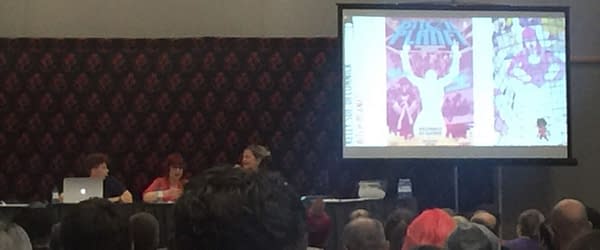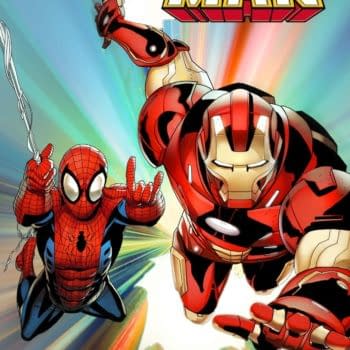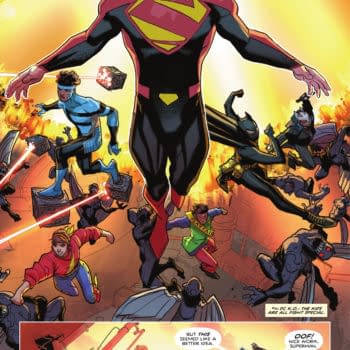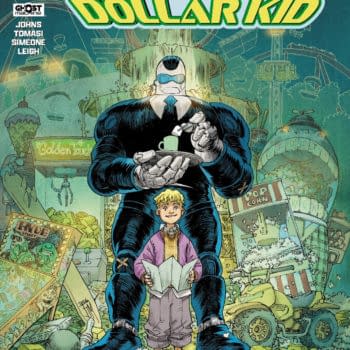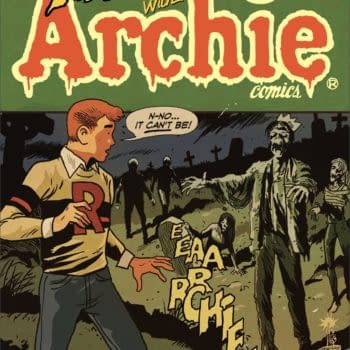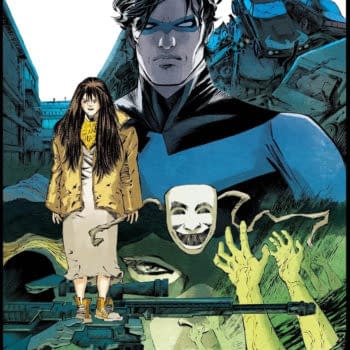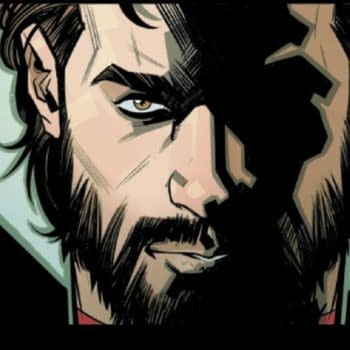Posted in: Comics | Tagged:
Chelsea Cain and Kelly Sue DeConnick at Rose City – How Bitch Planet Ends, Non Compliant Perfumes and Problems With Comics
Bleeding Cool understands the Rose City Comic-Con panel report below, by Ian Melton, occurred before Chelsea Cain had been informed by Marvel Comics that her Vision comic book series, of which four of the six issues had already been drawn by Aud Koch, would no longer be published, as it didn't fit with their plans for the characters of Vision and Viv Vision.
Kelly Sue DeConnick and Chelsea Cain took the stage at Rose City Comic-Con to discuss both of their books and their status as prominent female writers in the comic book industry. Both came with humor and candor as they discussed politics, humor, and of course writing. Starting off a candid discussion fueled by questions from the audience Kelly Sue was given the first questions leading her into a frank discussion about politics and how for the past few years she had "checked out" and didn't feel the need to really be involved in politics with Obama in office and now feels the last two years have been "incredibly humbling."
Cain's response, "I don't feel humbled, I just feel pissed off…"
DeConnick added that in talking to her friends and to people in general her sense of "American exceptionalism, and how special we are is just a lie, and I still think that idea, the ideal, is still a thing worth aiming for, but it is a real luxury. I think Obama was the best president I'll ever see in my lifetime. I'm not a socially active writer, but I am drawn to writing about power, who has it and who doesn't…" DeConnick went further to say that seeing how things have changed has reminder her that she has to get her body into the fight and not just sit on the sidelines, but that is something she's had to learn. Referring to Cain and her parents being hippies she added "you have to remember my parents were air force, my mom campaigned for Nixon."
Trying to tie all those thoughts together DeConnick said it was important to come to the stage and talk about how things do suck, and to speak out, "white feminism represent! But I think if you don't [say things suck], it's a lie, and our job as artists and humans is to seek the truth and if I have the privilege of being up on this dais then what better thing can I do then to model honesty and vulnerability, because that's how we connect to each other. I have my share of pissed off, don't get me wrong, I was born full of piss and vinegar."
Cain then took the chance and asked her own question to DeConnick. "What's your favorite thing you've written when you're pissed off?"
"Oh I kill people in the worse ways possible," DeConnick responded, prompting laughter from the audience.
"Do you have to rewrite those things because you're pissed off?"
"No, I always get those parts right the first time…"
Laughing along with the audience Cain brought the conversation back to her own experiences and how she enjoys comics so much because she gets to experience other people's perspectives and stories. Picking up on this DeConnick began talking about Maneaters, Chelsea Cain's new title coming soon from Image, and how sometimes some creators from other mediums come into the comic book field. "And Chelsea who is a very accomplished novelist has had the nerve to come in and immediately be very good at writing comics … which is great … I guess…"
Feeding off the audiences fresh burst of laughter DeConnick and Cain promoted Maneaters before Cain asked about Bitch Planet and its use of back matter and how it's used in the medium. Noting the long history of the letters columns in comics, and how Lazarus and Mind Mgmt. are the two that spring to mind the most for their use of back matter, both enjoy using back matter as a storytelling technique. DeConnick said it was a natural fit in Bitch Planet, and in her work Cain enjoys it for point of view which is something that in prose works very differently than in comics "and it's something I'm very interested in, especially from a feminist perspective since most of the time how we see the world is through a male gaze and it's nice to see it through other gazes too." DeConnick added they can be hard to come up with back matter but then ideas like "makeup ads" come up and it becomes a natural fit and something she gets very excited about.
DeConnick then asked the audience if they'd like some "exclusive news" which was met with a very enthusiastic yes from the audience. "Bitch Planet is not ready to return yet, there is stuff done, but we are waiting till there is a lot of stuff done." The exclusive news though was Bitch Planet related as Black Phoenix Alchemy Lab having done perfumes for Pretty Deadly, DeConnick's other main series, contacted her about doing perfumes for Bitch Planet for which DeConnick had only one reply: "Really?"
Black Phoenix Alchemy Lab works on creating "fragrance experiences" and have sent DeConnick "a whole bunch of prototypes" for Bitch Planet fragrances, even though the series doesn't seem like it would lend itself to "pretty smells". "So Val and I are going to do a live stream thing where we're gonna smell and talk about them. There is a Non-Compliant one that is amazing and very wearable. There is also one based off a douche ad and it smells like chemical daisies. I don't know how many of those we are gonna sell but I laughed my ass off."
Taking a question from the audience Chelsea Cain was asked about the imagery from Maneaters being related to cats, and that members of the trans community that the person knew felt excluded because of that imagery. "So how will you deal with that and incorporating the trans community and their experiences in the book?"
Cain paused while thinking about the question. "I'm not sure how the imagery of cats could be considered exclusionary… and Maneaters is about female adolescence and how girls turn into monsters when they get their periods … because they do … and that is a female exclusive experience. I do understand that being 'female' is not just a biological experience." Cain explained further that a chemical found in cat faeces that mutates is what causes the change in girls in the series and that is part of where the idea of the cat imagery comes from but Cain is in no way trying to be "exclusionary to anyone with this book."
DeConnick next fielded a question that has nothing to do with comics as the girl in the audience wanted to know where DeConnick got her glasses from. "They are Zenni's and I fear the reason they are so god damned affordable is because they are made in some third world country by children in chains and then once I know this I won't be able to buy them anymore…"
Chelsea Cain was then asked how hard it was to switch gears from writing prose to comics which led her to talk about how she would talk to comic book creators she knew and deconstruct the comics she liked, "reverse engineering them" so she could articulate what she liked about them. Mockingbird, being her first comic, took "an ungodly amount of time". She filled a notebook with drawings, "which I don't draw", so she could understand the visual beats and get the right sense of rhythm for the panels. She also had to learn the language to use for an artist to explain the images and ideas in her head so the artist could convey them. "That part slowed me down the most…"
DeConnick then suggested several ideas for strengthen comic book writing: 1) Take a comic you really love and trying to produce the comic script for it, 2) take a short story you have and rewrite it for three different artists, focusing on how it would be different for each artist you are writing for.
The next question focused on DeConnick and Cain's opinions on the current comic landscape "with Saga on hiatus for a year now, the Walking Dead slowing down, sales slumping, are the creators you know doom and gloom? Is it optimistic or pessimistic?"
DeConnick said she knew both types of creators. "You all know Ed Brubaker? Yeah Ed is like Droopy Dog. [Doing her Ed Brubaker impression:] Every day he is 'the world is ending, comics are dying, nobody reads, it's terrible!' and I have to say 'Ed, how do you get up every morning? You live in f-cking California!' That's out there, but that's in Ed's DNA … his books are so HAPPY!
And then … I think I'm inherently an optimist. I mean … okay spoilers … but in Bitch Planet … the women win! We have many volumes to go but we win! It's going to be all right … comics aren't going anywhere, they are going to change, maybe the direct market will go somewhere, and that will suck, but there was life before the direct market."
Chelsea Cain's take was a bit different. "I'm amazed this industry functions at all. It's totally f-cked up. Everything about it is f-cked up. The distribution model is f-cked up, I mean kudos to everyone whose gotten a comic, they make it hard."
Laughing, DeConnick had to remind everyone, "our industry was founded by pornographers and smugglers and you don't fall very far from your roots."
Cain added that though there are many comic fans out there, many don't know they are fans. Commenting on the difficulty of getting into buying comics, she added that people who don't have a relationship with a comic book store or past experience buying comics have a really hard time getting comics "until it is a volume in a book story or it penetrates the everyday world you live in." One positive she offered is that comic book fans are the biggest evangelists for comics, and anyone who shows a mild interest in comics around a comic fan will get the biggest proponent for comics trying to help them.
Bringing the conversation back to the art form, DeConnick was asked what drew her to the genre of mystical westerns when it came to Pretty Deadly. "Well I wanted to do a book with Emma Rios, we had done Osborn for Marvel, and I pitched her a mother/daughter road trip/heist thing in the 70's and she said no.
And she was like 'what about a Western?' and I was like 'Western it is!' so that's what drew me to Westerns…
But when I started developing it, what are Westerns to me, what is the story? It started with me wanting to do the Man With No Name but with a woman, and that's Ginny, and she started off as a sharp shooter in an old west show and I was interested in the time period where the West was ending.
The series has come a long way since then. Cissy was only created because Ginny wouldn't talk. I needed Cissy to be the dog that Josie Whales spits upon, I needed her to be someone who could move the story along. I write pretty intuitively so I write until it feels right, and Pretty Deadly didn't 'feel right' until the monsters came in, and the magical realism aspects came in, that's when it felt right.
The third volume is well into production and waiting for solicitation, waiting to get it on Jordie's calendar to get it colored. The first volume was White Death, second volume was White Luck, third volume is White Heart. First volume was weird Western, second volume was war comic, third volume is noir murder mystery. First volume was set in the American West, second volume was set in World War I, third volume is set in 1920's Los Angles."
Stumping both writers, they were asked by an audience member if there have been memorable moments of reckoning where the writers discover things they never intended to be there, especially when switching between forms of media when working?
DeConnick: "That's such a good question. Congratulations on that question."
Cain: "Here. Can we give him this? So we don't have to answer the question."
Handing over a prize, DeConnick commented that there have been times when she's been asked if she "meant for that to happen" and she just nods yes, even though it completely accidental, but at this moment in the panel, she couldn't think of any.
Cain was next asked about the difference between working for Marvel and Image, and what was up with Mountain Dew in Mockingbird? Commenting the two companies are very different, but she was unsure if the differences are actually specific to the publisher or just her experiences at the time based on how she has been as a writer for both. "Comics are screwy. Like full of lovely people, but a strange business process." And as for Mountain Dew, "much of Mockingbird was in-jokes for my 13-year-old daughter. And that was one of them."
To end the panel DeConnick added that she had worked for many comic book companies and when it comes to being a starting writer "write it like you own it." With that, the panel ended to applause as the two writers thanked each other and left the stage.


